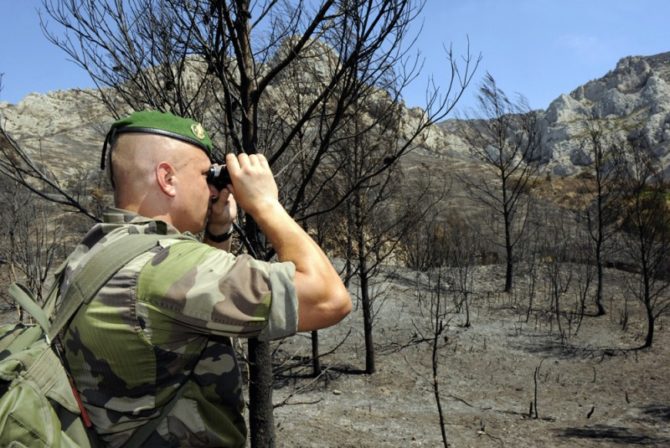The French-American Foundation Weekly Brief

FRANCE
French doctors treating a 62-year-old Cameroonian woman living in Paris have identified a new strain of HIV that appears to have originated in gorillas instead of chimpanzees, according to the BBC. France24 cited researchers who said that “the discovery of this new family of HIV-1 highlights the need to closely monitor the emergence of new HIV strains.”
Two separate disasters troubled residents of Southern France this week: military exercises caused brush fires near Marseille, forcing residents to flee their homes, according to Reuters, and nine beaches were closed in the region after a “month’s worth of rain” fell on the region in less than an hour, heavily polluting local waters, according to the Connexion.
Agence France Presse reported that the French shellfish industry is in crisis, as a “mystery ailment” has wiped out anywhere from 40 to 100 percent of new oyster stocks.
In the New York Times, Michael Kimmelman analyzed how tourists examine works of art at the Louvre, and how art connoisseurship has changed along with changes in consumer culture.
UNITED STATES
The Atlantic Community conducted a statistical analysis of the economic mores of Europe and the United States, concluding that Americans may be more “European” than previously thought. In Hernando Today, John Reiniers reflected on “who we are as Americans” by looking back on the writings of Alexis de Tocqueville. Slate.com ran a series of pieces speculating as to how America might come to an end.
WNYC reported that New York City officials are considering a Paris-style bike share program similar to the “Vélib” initiative pioneered in France.
In a debate on France24, panelists argued as to how much U.S. foreign policy has changed during the administration of President Barack Obama. An analysis at the Atlantic Council argued that European cooperation and assistance is critical for President Obama to keep his campaign promise of closing the U.S. detention center at Guantanamo Bay in Cuba.
Le Nouvel Observateur reported that Judge Sonia Sotomayor was confirmed by the U.S. Senate, becoming the first Hispanic woman to serve of the U.S. Supreme Court.
BUSINESS AND ECONOMY
The U.S. Senate approved an additional $2 billion to extend the “cash for clunkers” program, which subsidizes the purchase of new, fuel-efficient cars, according to Le Point. Le Monde described the success of a similar program in France, with 20 percent of new car sales in France benefiting from the subsidy.
Manufacturing economies in Eastern Europe are gaining strength as their main export markets in Western Europe are showing signs of recovery, according to Forbes.
NPR asked whether the “lightly regulated, dynamic capitalism” once ascendant in the United States will be replaced by a “less volatile” European-style market structure. Le Parisien noted that economic advisors within the Obama administration are saying that the end of the recession is near, and at Project Syndicate, Martin Feldstein reflected on America’s savings rate and the future health of the dollar.
In the New York Times, Pierre Bessard, head of the Liberales Institut, argued in defense of Swiss banks, saying that Swiss banking confidentiality and tax law “benefit other countries” outside of Switzerland.
INTERNATIONAL
France reiterated its support for reaching out to the Taliban in Afghanistan and negotiating “with those who are ready to lay down their weapons and talk,” according to Agence France Presse. Bloomberg reported that three U.S. troops and one French soldier were killed in Afghanistan, and the New York Times noted that NATO leader Anders Fogh Rasmussen called for stronger European efforts in Afghanistan in the fight against the Taliban and Al Qaeda. Voice of America noted that the NATO
chief made a surprise visit to the region.
The Korean Chosun Ilbo reported the release of two American journalists held by North Korean authorities following a diplomatic mission by former President Bill Clinton. The Cable blog at Foreign Policy magazine described the backchannel negotiations for the journalists’ release that took place even before Clinton’s trip began.
In the New York Times, Fouad Ajami examined the experience of Muslims in Europe, using France as an example, in his book review of Christopher Caldwell’s Reflections on the Revolution in Europe.
The New Scientist argued that warfare and violent conflict are not innate to human nature and that it is possible to “win the ultimate battle” and end war in human society. “The fact that slaughter is a horrifying spectacle must make us take war more seriously, but not provide an excuse for gradually blunting our swords in the name of humanity,” said Carl von Clausewitz, as the Chronicle of Higher Education reviewed his work as a military educator.
The views expressed in the preceding press coverage are solely those of the authors and do not reflect the views of the French-American Foundation nor its directors, officers, employees or representatives.
Please direct comments or suggestions to [email protected] and [email protected].
Share to: Facebook Twitter LinkedIn Email



